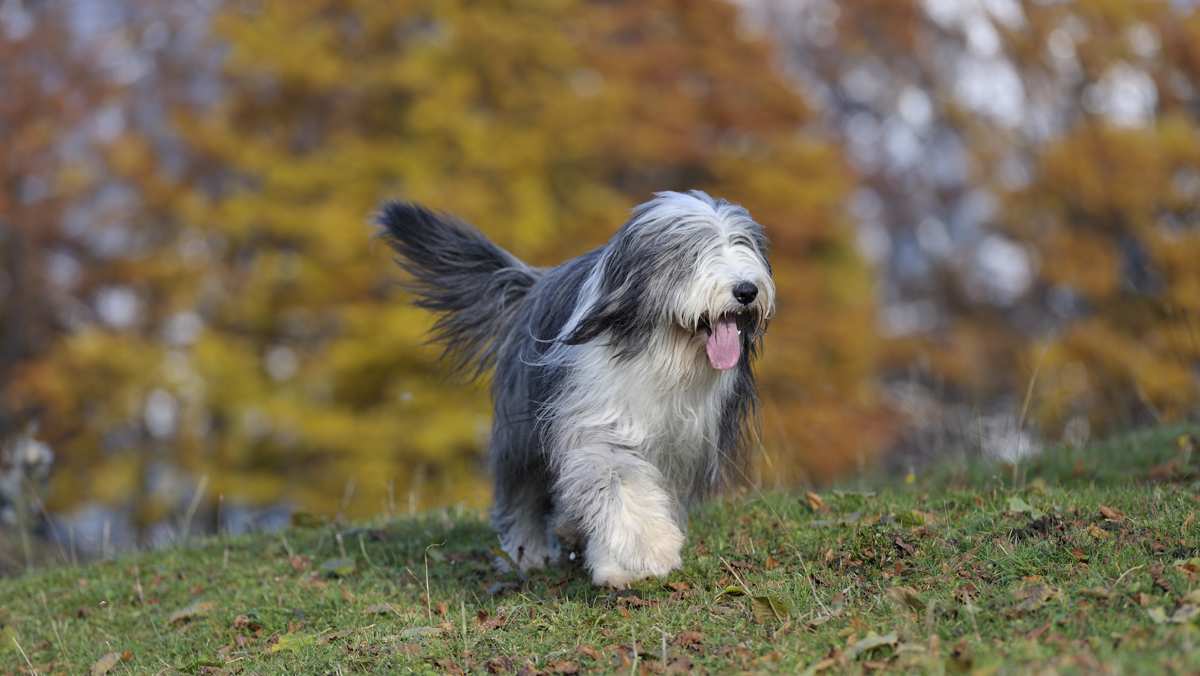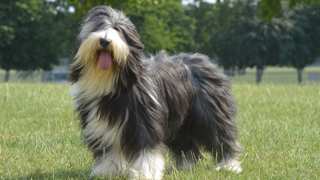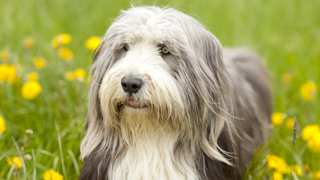Argle Bargle
Beardie
Beardie Dog
Beardie Puppy
Collie Bearded
Hairy Mou'ed Collie
Highland Collie
Mountain Collie
The Bearded Collie is a herding dog that originated in Scotland in the early 1500's. The breed has high energy and a strong herding instinct which may make it difficult for city life or for families with a busy schedule. Despite the endless energy the breed seems to have, Bearded Collies make great family pets.
As a herding breed, you can expect the bearded collie to have high intelligence and will find the dog is capable of problem solving issues which, while ideal for farming, may lead to mischief if there is a lack of mental stimulation in the household. You can expect the breed to excel at training and to pick up new tricks almost effortlessly. A common complaint among owners is Bearded Collies tend to become bored and lose interest with training sessions that are too easy or predictable.
Bearded Collie Breed Details
Its hard to resist the perpetually wagging tail and bouncy playfulness of a Beardie. Their very high intelligence and great memory made them a Hollywood favorite for awhile; Bearded Collies have appeared on screen in movies such as Shaggy Dog featuring Tim Allen and as the family pet in The Brady Bunch. Before all this fame they were best known for their herding and droving abilities; they also make excellent showdogs as they excel in agility and conformation activities. This may sound very exciting but not so fast! Check out these Bearded Collie facts for a better understanding if the breed is right for you:
Iconic looks
Very intelligent
Alert watchdog
Natural herding, droving instincts
Good exercise buddy
Happy and playful
Friendly with strangers and visitors
Affectionate and devoted
Great for families
High energy, must get plenty of daily outdoor exercise
Not suitable for apartments
High maintenance grooming needs
Not hypoallergenic
May be difficult to train for a new owner
Needs lots of attention
Not a guard dog
Must be supervised around small children due to high energy level
Purebred
12 - 14 yrs.
20 - 22 in.
40 - 60 lbs
OverallFamily FriendlyChild FriendlyPet FriendlyStranger Friendly
Easy to GroomEnergy LevelExercise NeedsHealthShedding Amount
Barks / HowlsEasy to TrainGuard DogPlayfulnessWatch Dog
Apartment DogCan be AloneGood for Busy OwnersGood for New OwnersIntelligence
Bearded Collie Breed Description
Do you remember the family dog from The Brady Bunch or the pooch TIm Allen morphs into in the movie You Shaggy Dog? That's right, these are Bearded Collies! It's hard to forget that long, shaggy coat, hairy face and those expressive eyes. You may have mistaken the Bearded Collie for an English Sheepdog as they do look very similar except for the presence of a tail (the English Sheepdog doesn't have one). They are working dogs with the natural instincts to herd sheep and drove cattle. Beardies are also devoted and affectionate, which means they need plenty of attention and an owner/family that is ready and willing to take them on plenty of adventures.
Beardies are excellent pets for active individuals and families. They are not recommended for apartments as they need a lot of space. Homes with extensive property, or at least a big yard, are recommended. This extra space will help keep these busy bodies out of trouble as they are naturally alert and will enjoy keeping an eye on things. Bearded Collies are great additions to households with kids, other pets, and frequent visitors. They can play a little rough so keep an eye on interactions between them and small children. They are known to do quite well with other dogs and even cats! These happy, friendly pooches will enthusiastically greet each and every guest. Be sure to start training early so these bouncy balls of energy know how to act politely around guests.
This breed is considered high energy and needs plenty of exercise. If you have a large property or ranch they will be excellent workers, however, the average Beardie can get his exercise from plenty of daily outdoor walks and playtime in the yard. Training in obedience, agility, and conformation are also ways to keep their highly intelligent minds occupied. First time dog owners may find more suitable matches in other breeds as Animal Planet's Dogs 101: Bearded Collie emphasizes that the breed takes a lot of patience to train.
Bearded Collie Breed History
Many readers may automatically assume the Bearded Collie originated in the Scottish Highlands due to its alternate moniker "Highland Collie"; although they were popular there beginning in the early 1800s, this is not necessarily the case-- many regions had them taking shape as a skilled working dog. Like many other working breeds, the Bearded Collie's origin is not truly known. They have been known by many names including the Mountain Collie, Highland Collie, Hairy Mou'ed Collie and even the Argle Bargle (which is quite a comical name to say). The general idea is that they probably descended from Polish Sheepdogs and Magyar Komondok as early as the 1500s, however, not even the date is certain. One thing we do know, however, is that this shaggy, energetic canine was utilized to herd sheep and drove cattle for hundreds of years before being noticed by the wealthier classes. The breed began to appear in painting during the 1700s and literature from the 18th and 19th century describes many a Beardie as "shaggy, hairy-faced, hardy, muscular and rough"; a more humorous description of the coat by D.J. Thomas Grey in 1891 read "with a coat not unlike a doormat".
The breed was establish long before the World Wars and, therefore, remained popular throughout this time ensuring that when the wars were over there was an energetic push for the breed to be accepted by various kennel clubs. The AKC recognized the breed in 1974 but it wasn't until 1983 that they became one of the first members of the Herding Group. The Bearded Collie is living proof that a breed doesn't have to have a defined history to be valued world-wide.
Bearded Collie Appearance
Beardies are often confused for English Sheepdog, however, the main difference is that the Bearded Collie does have a tail; Beardies are also thinner than their doppelgangers. Overall, these dogs are medium sized, longer than tall, and muscular. The two most defining characteristics of this breed are the coat and the eyes.
They may be hard to see under all that hair but this breed's eyes are quite inspiring. They have been called inquisitive, expressive, understanding and soft among many other things. A unique feature of the breed is that the eyes always match the coat. A brown Beardie will have some shade of brown eyes while a blue will have more smoky or light eyes. This is also true for the lips, eye rims and nose--they will mirror the coat color.
The Bearded Collie coat is quite something-- as picturesque as it is high maintenance. Beardies are born either black, blue, brown or fawn with or without white markings. The coat will lighten as the puppy becomes an adult but, although lighter, will remain the same general color (i.e. a brown may become light brown or chocolate) The hair is very long but shouldn't be allowed to be so long it reaches the floor and is usually straight but can be slightly wavy. It consists of a short, soft underlayer and a long, harsh outer layer to protect it in wintery or wet climates.
The images below represent the coat colors and patterns associated with Bearded Collies.
Bearded Collie Variations
Bearded Collies are dogs that vary little from one to the next, aside from coat color (they can be brown, blue, black or fawn with or without white markings). They naturally have long hair' if you see a Bearded Collie with short hair you can be sure that it has been groomed that way or is not a purebred. Although small ones do exist, as they do with every breed, they are not considered standard as they are meant to be medium sized dogs. Miniature Bearded Collies may exist from the experiments of some breeders out there but there is no official breed named as such and Mini Bearded Collies are in no way Kennel Club approved. The attempt at down sizing a medium sized purebred could result in harm to the puppies and unhealthy litters with more genetic problems.
Bearded Collie Temperament
The Bearded Collie's temperament makes him/her an excellent companion for active individuals and families. We stress active because they are notorious busy bodies that need to have a job to do. Job is a word used loosely, of course, as this can be a literal job such as herding or simply plenty of daily outdoor exercise. Above all, these amusing, bouncing balls of energy must have a hands-on owner/family that has plenty of time to spend with them daily. Not only do they need daily outdoor time in the form of long walks or playtime in the yard; they also need plenty of love and attention-- and will return it with affectionate devotion! This playful breed also needs early training from an experienced handler, therefore, it may be a better fit for those with previous experience owning a dog. They are very intelligent with an above average memory which means training may be difficult but will be very rewarding.
The Bearded Collie personality is a very good match for families with children. To play and receive attention will keep their wagging tails in perpetual motion. It's necessary to supervise small children around them, not due to aggression but rather their rambunctious play may accidentally knock over the child. With socialization this breed is known to get along well with other pets, both cats and other dogs. Bearded Collies are usually friendly towards visitors and strangers, so they make a great choice for those that have frequent visitors or desire a pet they can take out and about.
Beardies are high maintenance in almost every way. Their long, double coat will require daily brushing to remain in healthy condition and a bath is recommended every 6-8 weeks. Many owners choose to get their Beardie professionally groomed. Bearded Collies are not hypoallergenic and they do shed a little; once per year they will shed heavily and this can last up to a month, however, the daily brushing will greatly help the amount of cleanup you will have to do. The Bearded Collie Association of America states that a weekly spray with conditioner will keep their coat in tip top shape.
These active busy bees need a yard to run and play in and are not recommended for apartment dwellers. They may be friendly toward strangers but enjoy guarding and will be on high alert-- they are not shy about barking. To keep their intelligent little minds busy you will need to exercise them outdoors daily as well as provide plenty of training. They also enjoy herding, tracking and even make good therapy dogs. Some call them stubborn so they are not a breed for the faint at heart-- be ready to train them consistently and firmly from the very start.
Bearded Collies often live between 12-14 years with few major health issues. Preventative measures for your pet include taking/ her to regular veterinary checkups, brushing the teeth every week and keeping the coat clean and free of mats and tangles. Also, it may be easy to forget to check those ears hiding under all that hair but doing so will prevent dirt and wax buildup. Eye exams are recommended for this breed. Although the Bearded Collie breed is generally a healthy one, you should consider the following list of potential health issues; bear in mind your Beardie may live a long healthy life and not be affected by any of them.
- Joint problems such as hip dysplasia and arthritis
- Hypothyroidism is an endocrine disorder than can affect many aspects of your dogs body so it's best to get this blood test if you sense anything is out of the ordinary.
- Addison's Disease affects the dogs adrenal glands and result in dehydration, low energy and depression--this also is detectable via a blood test.
- Cancer
- Eye Diseases
Remember, if you decided to purchase a Bearded Collie puppy from a breeder do your research and find a reputable and responsible one with plenty of good reviews from other owners.
Bearded Collie Health Concerns
Below are potential health concerns associated with Bearded Collies.
Addison's disease
Cancer
Hip dysplasia
Allergies
Hypothyroidism
Arthritis
Eye diseases






